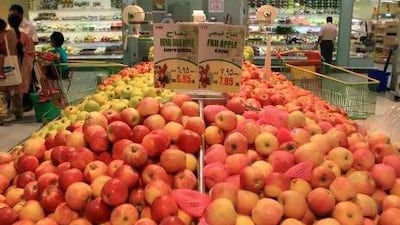My son, Charlie, is 4 months old and specialises in eating and growing. He does both at an alarming rate, and so he should, as he is a very happy and very healthy growing boy.
Little does he know, however, that in excelling so superbly in both aspects of his recently acquired humanity, Charlie is the embodiment of the two greatest socio-economic pressures facing the Middle East.
The rapidly growing populations of the Middle East and securing reliable and sustainable supplies of food to support that growth have loomed since the region's vast oil and gas wealth was discovered decades ago.
The Gulf has never been a particularly viable region for agricultural development - deserts tend to be that way. North Africa, the Levant and greener parts of the region, by contrast, have served as the breadbasket of the world for millennia. Indeed, Cleopatra had so much spare grain, you will recall, that she fed Rome's armies for years - not that it did her any good.
But today, there is nowhere near enough food in the Middle East and North Africa to feed the rapidly growing population.
A recent study by the Qatari banking group QNB Capital shows that the search for food to feed the region is only going to get harder.
The bank estimated that the population of the GCC alone would hit 50 million by next year, from 33 million in 2004. Population growth, while slightly slower than before the global economy ground to a halt, is still running at more than 3 per cent, almost three times faster than the global average.
The more prosperous the region becomes, the more we urbanise, modernise and develop society. And that attracts an even larger population that, again in turn, needs an even larger supply of food.
The problem of population growth and food supply is global. China has been forced for generations to impose severe population-limiting legislation as it attempts to navigate the perilous frontier of massive development and sustainability.
But there are elements of this global problem that are unique to the Middle East. This region and North Africa already import about 90 per cent of all their food. What is more, the latest data from the Economist Intelligence Unit suggests that imports are set to climb by as much as 105 per cent from US$25.8 billion (Dh94.76bn) in 2010 to $53.1bn in a decade or so.
The UAE imports about 80 per cent of its food at a cost of about $3bn a year and consequently is at the mercy of market forces.
Food imports in this country are expected to jump about threefold to $8.4bn by 2020, according to the latest data cited by Sheikha Lubna Al Qasimi, the Minister for Foreign Trade, who spoke yesterday at the opening of Gulfood 2012, the huge food trade show taking place this week in Dubai.
Similar to the rest of the region, population growth in the Emirates is pushing up our food consumption dramatically. Our population currently eats about 7.8 million tonnes of food a year, a quantity expected to rise by 5.4 per cent a year to 9.7 million tonnes by 2015.
According to the latest data from the UN, the world needs to invest another $70bn a year on food production, storage, transportation and development to ensure the growing global population has enough to eat. If the investment is not made, the UN predicts, we can expect hunger and famine as soon as 2050.
The UAE has taken up that challenge, investing in agricultural land all over the world, from Sudan to Macedonia. This policy of forging partnerships with regions that need investment and development is canny but cannot be applied globally.
It is clear we also need to embrace technology to enable us to double or triple food production to meet our needs. It may not sound too tasty, but just yesterday a Dutch scientist unveiled what purports to be a hamburger grown in a test tube from bovine stem cells.
As we increase in number, the world is not getting any bigger. We can no more force the population of this region, or anywhere else for that matter, to stop growing any more than we can ask Charlie to remain at his current size - no matter how attractive such a prospect might seem.
twitter: Follow our breaking business news and retweet to your followers. Follow us

